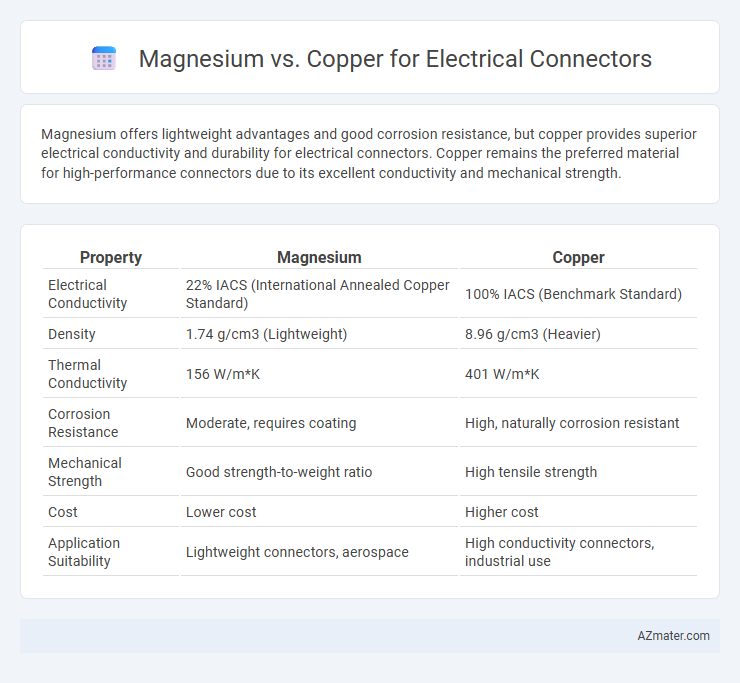Magnesium offers lightweight advantages and good corrosion resistance, but copper provides superior electrical conductivity and durability for electrical connectors. Copper remains the preferred material for high-performance connectors due to its excellent conductivity and mechanical strength.
Table of Comparison
| Property | Magnesium | Copper |
|---|---|---|
| Electrical Conductivity | 22% IACS (International Annealed Copper Standard) | 100% IACS (Benchmark Standard) |
| Density | 1.74 g/cm3 (Lightweight) | 8.96 g/cm3 (Heavier) |
| Thermal Conductivity | 156 W/m*K | 401 W/m*K |
| Corrosion Resistance | Moderate, requires coating | High, naturally corrosion resistant |
| Mechanical Strength | Good strength-to-weight ratio | High tensile strength |
| Cost | Lower cost | Higher cost |
| Application Suitability | Lightweight connectors, aerospace | High conductivity connectors, industrial use |
Introduction: Magnesium vs Copper in Electrical Connectors
Magnesium and copper serve distinct roles in electrical connectors due to their contrasting electrical conductivity and mechanical properties. Copper, with a conductivity of approximately 59.6 MS/m, is widely preferred for connectors requiring high electrical performance and durability. Magnesium, significantly lighter but less conductive at around 22 MS/m, is chosen for applications prioritizing weight reduction and corrosion resistance.
Electrical Conductivity: Magnesium Compared to Copper
Copper exhibits significantly higher electrical conductivity than magnesium, with a conductivity of approximately 59.6 x 10^6 S/m compared to magnesium's 23 x 10^6 S/m, making copper the preferred choice for electrical connectors requiring efficient current flow. Despite magnesium's lower conductivity, its lower density offers a favorable strength-to-weight ratio, but this advantage is often outweighed by copper's superior ability to minimize resistive power losses in electrical applications. In designing connectors, the trade-off between conductivity and weight requires careful consideration, but copper's dominance in conductivity ensures its prevalent use in high-performance electrical connectors.
Mechanical Strength and Durability
Magnesium connectors offer high strength-to-weight ratios but generally have lower mechanical strength compared to copper, which provides superior tensile strength and robustness for heavy-duty electrical applications. Copper exhibits excellent durability with high resistance to fatigue, corrosion, and deformation under mechanical stress, making it ideal for reliable, long-lasting electrical connections. Magnesium's lighter weight benefits applications where reducing mass is critical, but its lower ductility and susceptibility to corrosion require protective coatings to enhance connector longevity.
Corrosion Resistance in Electrical Applications
Magnesium offers moderate corrosion resistance but is prone to rapid oxidation and galvanic corrosion when paired with dissimilar metals in electrical connectors, limiting its long-term durability in harsh environments. Copper exhibits superior corrosion resistance due to its stable oxide layer formation, ensuring reliable conductivity and longevity in electrical applications. Selecting copper ensures enhanced protection against environmental degradation, critical for maintaining connector performance and safety.
Weight Considerations: Lightweight vs Traditional
Magnesium offers a significant weight advantage over copper, making it an ideal choice for electrical connectors in applications where reducing mass is critical, such as aerospace and automotive industries. Copper, while heavier, provides superior conductivity and durability, which are essential for high-performance electrical connections. Engineers often balance these weight considerations against performance requirements to optimize connector design.
Cost Analysis: Magnesium and Copper Pricing
Copper remains the industry standard for electrical connectors due to its superior conductivity but comes at a higher cost, typically priced between $6 to $8 per kilogram as of 2024. Magnesium offers a cost-effective alternative, with prices generally ranging from $2 to $3 per kilogram, significantly reducing material expenses in large-scale manufacturing. When factoring in overall cost analysis, magnesium's lower price combined with its lightweight properties can lead to substantial savings, especially in applications where weight reduction is critical and slightly lower conductivity is acceptable.
Thermal Conductivity and Heat Dissipation
Copper offers superior thermal conductivity, approximately 401 W/m*K, compared to magnesium's lower value around 156 W/m*K, making copper more efficient at heat dissipation in electrical connectors. The higher thermal conductivity in copper ensures better management of heat generated by electrical currents, reducing the risk of overheating and enhancing connector reliability. Magnesium, while lighter and corrosion-resistant, is less effective in dissipating heat, which may limit its application in high-temperature or high-current environments.
Environmental Impact and Sustainability
Magnesium connectors offer a lower environmental impact due to their lighter weight, which reduces transportation emissions and energy consumption during manufacturing compared to copper. Copper is highly recyclable and has a well-established recycling infrastructure, minimizing waste and conserving natural resources. Magnesium's extraction process can be more energy-intensive, but its potential for weight reduction in electrical systems supports sustainability goals by improving energy efficiency in applications.
Common Applications and Industry Preferences
Magnesium connectors are favored in aerospace and automotive industries for their lightweight and high strength-to-weight ratio, enhancing fuel efficiency and performance. Copper connectors dominate in electrical and telecommunications sectors due to superior electrical conductivity and corrosion resistance, ensuring reliable signal transmission and durability. Industry preferences lean toward copper for high-current and long-term outdoor applications, while magnesium is selected for weight-sensitive environments requiring structural integrity.
Future Trends in Electrical Connector Materials
Magnesium and copper both offer distinctive properties for electrical connectors, with magnesium providing lightweight advantages and copper excelling in electrical conductivity and corrosion resistance. Future trends emphasize the development of composite materials and alloy enhancements to combine magnesium's lightness with copper's superior conductivity, targeting improved performance and sustainability. Advances in nanotechnology and material science are driving innovations toward connectors that balance weight, durability, and efficient electrical transmission in emerging applications like electric vehicles and renewable energy systems.

Infographic: Magnesium vs Copper for Electrical Connector
 azmater.com
azmater.com